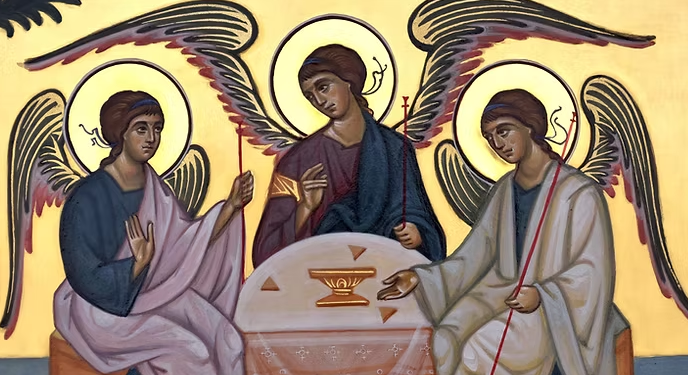One of the great theological mysteries of our Catholic faith is that of the Most Holy Trinity, that is to say, how three divine persons are in fact, one God. But just because this is a profound mystery which we can only fathom in part through revelation, Scripture, and tradition, this is not to say that this belief in the “triune” nature of God doesn’t have real and practical meaning or implications for our lives. At the heart of this mystery, we might discern so much meaning that it’s no surprise that the sheer number of treatises on the Trinity are too numerous to count. But if I were to put my finger on one element for our attention today, one element with so much practical implication for our day to day lives and for the ways we lead, I would say that it is about being, relating, and acting together in mutuality.

The hospitality of Abraham (2020) – icon by the Laboratorio Nazareth
Our readings for the Solemnity today are taken from the book of Proverbs, Paul’s letter to the Romans, and the Gospel of John. In all three, the qualities of the relationships described are marked by freedom, love, delight, respect, and a generous exchange and transmission of gifts. Whether the relationship is between God as Creator, and Wisdom, aka the Holy Spirit in Proverbs, or between us and God through the Holy Spirit in Paul’s letter to the Romans, or between us and God through Jesus and the Holy Spirit in John, there is no hint of coercion, no burden of debt or duty. Instead, in the relational space between these distinct persons, there is an openness that is free from fear, from pressure, threat, or force. There is no hint of what we might call “unilateral” authority or action, which is to say, no one of the divine persons exercises any right, privilege, or power against the others. Instead, all the Divine agency, all action is mutual, consenting, peaceful, and harmonious.
Wouldn’t it be nice if all of our human relationships were so?
What allows the Divine Persons of the Holy Trinity to operate this way? They “co-operate.” Like members of a team who are playing for the same goal, they understand themselves to be interdependent with one another, such that the Father cannot be complete without the Son, and neither of them can relate to one another except through the Holy Spirit. While this might seem like a constraint or a limit within the life of God, they each accept this “limit” of interdependence and find joy and delight in their loving relationship, their co-laboring on behalf of all of Creation, including for our ultimate flourishing. Their mutuality is beyond a kind of quid pro quo reciprocity, but rather, a free expression of love, the kind of love we see between partners in a mature and healthy marriage, in a mature friendship, or in a healthy and well developed community.
By contrast, what gets in the way of mutuality in our human ways of relating, or leading? When I reflect on my own life, I can see that when I am centered on myself, not taking others into consideration, or when I act in a unilateral way that exercises authority in a top down way, without consultation, I usually cause frustration for others, and spend more time trying to repair relationships or overcome obstacles than if I had acted in a more mutual way from the start.
Just this past week, I was working with one of my colleagues facilitating a process of accompaniment for a leadership team. While I had a perfectly clear vision for the process in my own head and confidence about how it would go, she expressed concern about what she perceived as a lack of preparation, and pressed for a more detailed plan. I realized in my evening Examen reflection that I was behaving in “unilateral control mode” and not working in a mutual and collaborative way. I was assuming that my colleague could read my mind, trust my experience, and that she would simply go along with my plan, supporting the process as needed. Fortunately (through the intervention of the Holy Spirit!), I was reminded in my prayer of our interdependence as a team, my desire to operate in a mutual style, and of the value of blending our gifts (which is 99% of the time the better way!). The next morning, we began in a far more harmonious, effective, and even joyful spirit.
We may be only human, but according to St. Augustine, the Divine Trinity lives within and amongst us, joining our minds, hearts, and wills so that we can find this peace and delight in our loving cooperation with God’s grace. And in our human relations, our lives in community, our mission focused teamwork, we can imitate the mutuality of God’s way of relating by noticing when and how the directions of our intentions or actions steer in the other direction- in a way that is self-centered or self-driven. When we notice this, we can pray for the grace to reconnect with the interests and the care for others, so that we can act together in a co-operative, co-responsible, and co-laborative way that is more creative, harmonious, and effective.
As we explore how to live and lead within the context of the Church, or in secular settings, we will notice how frequently unilateral action creates conflict and unnecessary obstacles. And by contrast, we might pay attention to the ways that operating in a more mutual manner that includes the intentions and gifts of others generates not only experiences of peace and delight, but also better results. If you’re like me, you know that minding our tendencies to want to be in “unilateral control,” requires daily, even moment to moment awareness, and trust in God’s indwelling presence to bring us back into a state of mature interdependence, care for others, and trust in the Holy Spirit. How are you experiencing a call to grow in a healthy and mature mutuality with others? What small changes might you make in mindset or behaviors that could enhance the quality of mutuality in your relationships and in your actions?
On the road together,




